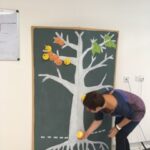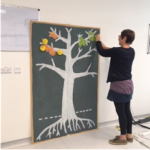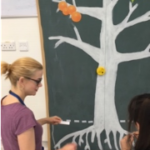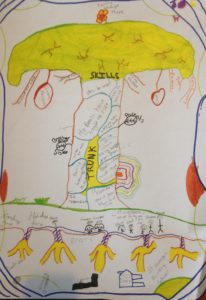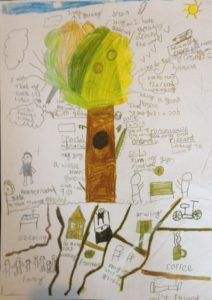Our training and work with groups aims to promote well-being and resilience and is based on systemic and narrative approaches. We place a strong emphasis upon social values and cultural awareness.
We believe that resilience is not just a mindset or a quality we possess as individuals but is also related to our social context, which is built through our connections with the important people in our lives and the networks of support around us.
For practitioners in communities and schools and other providers of services for children and young people
For practitioners working with people of all ages including schools, health and community settings
We are always happy to discuss and develop ideas for training in line with an organisation’s requirements. Please contact us to discuss.
Tree of Life
The Tree of Life was first developed in work with children and young people in Southern Africa whose lives were affected by HIV and AIDS. The flexibility and universal cross-cultural appeal of the methodology has led to its use in a broad range of contexts internationally and in the UK such as with refugee groups, acute mental health settings, learning disabilities, professional groups, women’s groups, etc. See the Dulwich Centre for more information.
The methodology uses metaphors from the natural world to emphasise people’s skills, abilities, hopes and dreams by inviting them to draw a tree to represent different aspects of their lives:
- The roots are where you come from, family history, favourite place, favourite song or dance, treasured objects and special memories.
- The ground is where you live, where you go to school or work, everyday activities and hobbies.
- The trunk represents skills, qualities and values
- The branches are hopes, dreams and wishes
- The leaves are important people in your life
- The fruits and flowers are the gifts you have been given
Tree stories are then shared and a ‘forest of trees’ is created to represent the community standing together. This process helps people to find a safe place to stand or ‘riverbank position’ from which to respond to the ‘storms’ of life.
Tree of Life within Physical Health Settings
We deliver a Tree of Life group intervention as a support option for people either living at risk of Huntington’s disease or who have had predictive testing themselves. We are offering narrative groups across a range of genetic conditions.
A recent research project with Manchester Centre for Genomic Medicine and Birkbeck London, offered Tree of Life groups as a way of working with people living with a family history of Huntington’s disease. A paper describing the outcomes of this work can be found here.
Our work using the Tree of Life within physical health has been presented at European Conferences including the European Conference in Narrative Therapy and Community Work in July 2016 and the European Society of Human Genetics Conference in May 2017.
Tree of Life in Schools
Schools are now expected to be finding ways of supporting well-being and building resilience among their students.
The Tree of Life is an innovative cross-cultural approach that is being used in schools all over the world. The simple beauty of the approach means a range of staff groups can get involved including teachers, pastoral and support staff.
We have experience in directly facilitating Tree of Life work in schools as well as training and supporting staff with delivery. For example, following our training and support, one teaching assistant extended her Tree of Life work with students to work with groups of parents.
Whole School Tree of Life
The Tree of Life can also be used at a whole school level. For example, following a training session that was delivered to the whole staff group, one primary school adapted the Tree of Life methodology to their respective classes from Reception (aged 4) up to Year 6 (aged 10-11). The success of the project was down to the way all the staff including the senior leaders, teachers, support staff and students got involved, inspired by the Tree of Life metaphor which appeals to all ages. Her Majesties Inspectors were impressed with the work earning a mention in the school’s OFSTED inspection report:
“Parents and carers hold the school in high regard in the way the staff care for pupils and help them in difficult times. For example, through an initiative called The Tree of Life, all pupils have been encouraged to be reflective. Pupils and their families experiencing trauma have been supported particularly well through this approach” (OFSTED, 2011).

